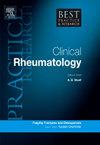血管炎的遗传学。
IF 4.8
2区 医学
Q1 RHEUMATOLOGY
Best Practice & Research in Clinical Rheumatology
Pub Date : 2024-12-01
DOI:10.1016/j.berh.2024.101969
引用次数: 0
摘要
全身性血管炎包括一系列以不同程度的血管炎症为特征的疾病。尽管脉管炎的病因仍不清楚,但积累的数据表明,某些环境因素的同时作用会诱发具有遗传易感性的人患上脉管炎。近年来报道的家族聚集性、不同种族的发病率差异以及与疾病易感性和严重程度相关的多种遗传学证据,不断证实了遗传因素的重要性。在大多数血管性疾病中,最强的关联信号与 HLA 区域内的遗传变异相对应,这表明免疫系统在其病理生理学中发挥着重要作用。然而,每种类型的血管炎都有不同的定义性 HLA 关联标记,这可能是由于抗原驱动因素的疾病特异性差异造成的。此外,位于 HLA 区域之外的其他基因多态性在不同血管炎的易感性中也起着重要作用。最近的研究对不同血管性疾病的共同遗传易感性进行了评估。未来的研究应侧重于鉴定可作为系统性血管炎早期诊断、预后和治疗反应的可靠生物标记物的遗传标记物。本文章由计算机程序翻译,如有差异,请以英文原文为准。
Genetics of vasculitis
Systemic vasculitis encompasses a wide range of conditions characterized by varying degrees of inflammation in blood vessels. Although the etiology of vasculitis remains unclear, accumulated data suggest that it is triggered in genetically predisposed individuals by the concurrence of certain environmental factors. The importance of the genetic component has been consistently supported by evidence of familial aggregation, differential prevalence by ethnicity, and multiple genetic associations with disease susceptibility and severity reported in recent years. The strongest association signals in most vasculitides correspond to genetic variants within the HLA region, suggesting an important role of the immune system in its pathophysiology. However, each type of vasculitis has distinct defining HLA association markers, likely due to disease-specific differences in antigenic drivers. Furthermore, other genetic polymorphisms located outside the HLA region play an important role in susceptibility to different vasculitides. More recent research has assessed the shared genetic susceptibility evident across different vasculitides. Future studies should focus on the identification of genetic markers that can serve as reliable biomarkers for early diagnosis, prognosis, and treatment response in systemic vasculitis.
求助全文
通过发布文献求助,成功后即可免费获取论文全文。
去求助
来源期刊
CiteScore
9.40
自引率
0.00%
发文量
43
审稿时长
27 days
期刊介绍:
Evidence-based updates of best clinical practice across the spectrum of musculoskeletal conditions.
Best Practice & Research: Clinical Rheumatology keeps the clinician or trainee informed of the latest developments and current recommended practice in the rapidly advancing fields of musculoskeletal conditions and science.
The series provides a continuous update of current clinical practice. It is a topical serial publication that covers the spectrum of musculoskeletal conditions in a 4-year cycle. Each topic-based issue contains around 200 pages of practical, evidence-based review articles, which integrate the results from the latest original research with current clinical practice and thinking to provide a continuous update.
Each issue follows a problem-orientated approach that focuses on the key questions to be addressed, clearly defining what is known and not known. The review articles seek to address the clinical issues of diagnosis, treatment and patient management. Management is described in practical terms so that it can be applied to the individual patient. The serial is aimed at the physician in both practice and training.

 求助内容:
求助内容: 应助结果提醒方式:
应助结果提醒方式:


